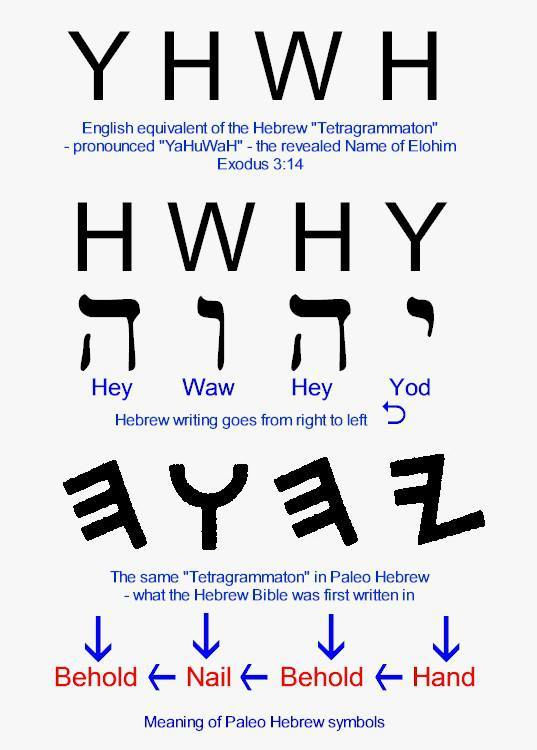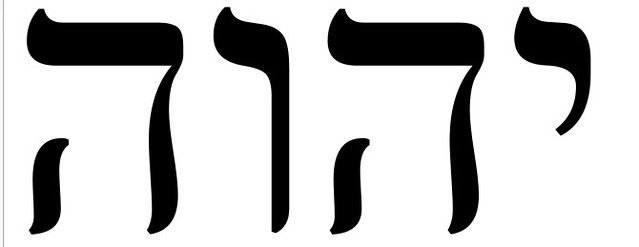The Restored Name of the Creator
- Taneallea Feddis
- Jul 3, 2020
- 7 min read
Updated: Oct 29, 2021

Today there are fourteen major sacred name groups, the most popular is the Assemblies of Yahweh which was born out of the Church of God (Seventh-Day) and was propagated by Clarence Orvil Dodd in the 1930s. The Jehovah’s Witnesses was also born from this movement. This movement puts emphasis on the Hebrew roots of Christianity and uses the reconstructed proper name of the Elohim of Israel, Yahweh, and the Hebrew name of the Son, Yeshua. They also keep the seventh-day Sabbath (from sunset on Friday to sunset on Saturday), the Old Testament Laws (Torah) and ceremonies (to a greater or lesser extent between them), including the annual Feast days and the food laws.
However, they all agree that names are important. Names are more than just how they sound. Especially in Ancient Hebrew, names have meanings. They are also a representation of someone’s authority, character, religion, and purpose. It is for this reason why we see the names of certain people being changed by God in the Scriptures, such as Jacob, Abram and Sarai. Even more important is our saviour’s name. The Messiah’s name in Hebrew is Yeshua, meaning saviour or redeemer (literally, it means “salvation” - Strong's H3444).
The Hebrew word for name is “shem”. It identifies the title or authority of the person bearing the name (Genesis 17:5, 15; 35:10; Matthew 10:42), the nature of the person (Genesis 2:7, 23), the role or purpose of the person (Isaiah 12:2, Matthew 1:21) as well as the character of the person bearing the name (Genesis 25:26, Revelation 9:11, 20:2). When the Son of God revealed His name to Moses at the burning bush, He declared His authority, nature, purpose, and character.
“And the Lord (the Word, who is Yeshua haMashiach) passed by before him (Moses), and proclaimed, the Lord, the Lord God, merciful and gracious, long-suffering, and abundant in goodness and truth, keeping mercy for thousands, forgiving iniquity and transgression and sin, and that will by no means clear the guilty (He is just); visiting the iniquity of the fathers upon the children, and upon the children's children, unto the third and to the fourth generation” (Exodus 34:6-7).

The Tetragrammaton, YHWH, often pronounced Yahweh, means “I Am that I Am” or “I Am He that Exists”, that is to say, He is who was from eternity and will be in the future, or into everlasting. So He is “the Alpha and the Omega, the beginning and the end” (Revelation 1:8). In addition, every Hebrew letter has a meaning, and if one should translate the meaning of each letter of the name YHWH, we would find our Creator's purpose. For it means “behold the hand, behold the nail[1]”. Names are important. The name of God is even more important, even for our very salvation! “Neither is there salvation in any other: for there is none other name under heaven given among men, whereby we must be saved” (Acts 4:12, KJV).
The fundamental drive behind the sacred name movement is the belief that there are prophecies in the Scriptures that appear to predict the revival of the name, haShem (Strong's H8034), in the last days. Seeing the importance of The Name, as discussed above, the movement gained momentum in the late 1980s and remains a popular trend today. The movement perhaps began with a man named Herbert W. Armstrong, the father of the Worldwide Church of God movement. This group believed in the dietary principles of Leviticus, the celebration of the annual Holy Feast Days, and the observance of the weekly Sabbath.
Following his death, the Worldwide Church of God ceased the practice of observing the weekly Sabbath and the Holy Feast Days and began having weekly meetings on Sundays instead of on Saturdays. The ensuing conflict over this change led to a fractioning of the group, leading to the birth of several daughter churches, the most popular today are the Church of God United, the Living Church of God and the Church of God International (founded by Garner Ted Armstrong, son of Herbert W. Armstrong). In recent years other Yahweh groups have also popped up. One very popular one is the Hebrew Israelite movement, which believes that the descendants of the Ancient Israelites are scattered around the world today and are the African slaves who were brought to the America’s during the slave trade.

The Name (the holy name of YHWH, “haShem”) orders our spiritual life. A common element among the Yahweh groups is a reversion to the Ancient Hebrew religion to form the basis of their worship. All reflect some aspect of the Ancient Hebrew language, religion and culture. The Hebrew Tetragrammaton (YHWH) occurs more than 6800 times in the Old Testament (Kohler, 1930) and is a rich topic for debates over the pronunciation, especially among these groups. Popular pronunciations include Jehovah, Yehovah, Yahweh, Yahuwah, Yahawah and Yahvah. The consensus is that the Tetragrammaton means “I Am”. This is not very far from the meaning of the root “HYH” (pronounced “hayah”) meaning, “to exist” or “will exist” (Strong’s H1961). Yahweh, the most widely accepted pronunciation was drawn from several lines of evidence and is perhaps the most accurate.
After my own research, I had come to favour the vocalisation “Yehwah”, which was based on my understanding of the niqquds[2] while studying Hebrew. These niqquds are dots found above or under letters of words and were added to the language at some time during the 13th century, at a time when use of the Hebrew language was in decline. However, after further study I realised that the niqquds associated with “YHWH” were the vowel sounds for “Adonai” or “Elohim” and were used to cue the reader to pronounce the word as “Adonai” or “Elohim” so that they would not pronounce the sacred name by accident, which was forbidden. Therefore, I had made the same mistake as Petrus Galatinus who transliterated the Hebrew letters with the Latin letters “jhvh” together with the vowels of Adonai in 1518, producing the ungrammatical aberration, “Jehovah”. Both vocalisations (Jehovah and Yehwah) are perhaps incorrect. He used Latin letters and non-Hebrew syntax, and I used Hebrew consonants and Hebrew syntax to arrive at the same error.
It became clear that YHWH had a reason for taking the pronunciation of His name from his people, and by extension the world. Although there are prophecies that speak to a latter day people who will come to know His name, these prophesies could be interpreted in so many ways and may in fact have nothing to do with having the correct vocalisation of the name. As discussed previously, names are more than how they sound. These prophecies may not mean a revival of the pronunciation of the name, but instead of the reputation, that is the character, authority, teachings and purpose, of the person bearing the name. This alternative meaning of the Hebrew word “shem” is often lost to us westerners because we do not usually use concrete thought to interpret the Scriptures. Therefore, we focus on the outward appearance of the name, how it is pronounced, instead of on the reputation of the person holding the name and what the name means.
In ancient Hebrew thought, a noun is understood according to its function, while in Western thought, a noun is understood by its appearance (Benner, 2004). For example, when we think of the oak tree, we think of the physical properties of that type of tree - its leaves, bark, branches and size. However, an ancient Hebrew would think of the oak tree according to its functional properties, such as its strength, that is, a leader among trees, and the fact that it offers shelter to other birds or animals. For this reason the Hebrew word “אַלָּ” is translated “oak tree”; “ram”, a leader among animals; “strong man”, or leader among humans; and “pillar” or “door post”, a strong support in a building (Strong’s H352). The name of Elohim is no different. We should interpret His name according to how the ancient Hebrews would, by His function as Creator and Redeemer – how He described Himself to Moses in Exodus 34:5-7.
Since it is my belief that a person’s personal name carries great significance, and generally is not transliterated or translated into another language, I will use the Hebrew pronunciation of our Saviour’s name, Yeshua, throughout this blog, since we know this pronunciation is an accurate one based on what we know of Hebrew culture and language, as well as from academic research. However, because the pronunciation of YHWH is lost to us and is a bit cumbersome to read without a pronunciation in mind, I will compensate for this by using His Hebrew title, “Elohim” or the generic “God” for simplicity. This will make reading easier and the title “Elohim” gives a beautiful reminder of His purpose and reputation as our “Mighty One” or the “Mighty One of Israel” (Strong’s H410). The title “Elohim” also served the purpose of elevating the Creator from the deities of other polytheistic religions of the pre-Christian world, and it is my desire to elevate His teachings on Paradise that were somehow lost to modern Christians, and the correct use of the Name, haShem, for the purpose of salvation.
Footnotes: [1] Y = hand, H = behold, W = tent peg or nail. Thus literally (using Hebrew syntax) YHWH means Hand Behold Nail Behold, or Behold the Hand, Behold the Nail (English syntax). Go Back to where I left off. [2] Niqqud (nikkud) is a system of vowel pointing or dotting used in Hebrew scripts to cue the reader on how to pronounce Hebrew words. These were introduced into the language around the 13th century by a group of Jewish scribes, called the Masoretes, during the period when Hebrew was no longer widely spoken and was used mainly in worship. The niqquds were added to help modern readers remember or learn the way the original, or the most common, pronunciation of Hebrew words. Go Back to where I left off.
Sources: 1. The Holy Bible
2. Strong, J. (1890). Strong's Exhaustive Concordance of the Bible. Abingdon Press.
3. Kohler, 1930
4. Benner, J. (2004). The Ancient Hebrew Language and Alphabet. Texas: Virtualbookworm.com Publishers Inc.

Comments